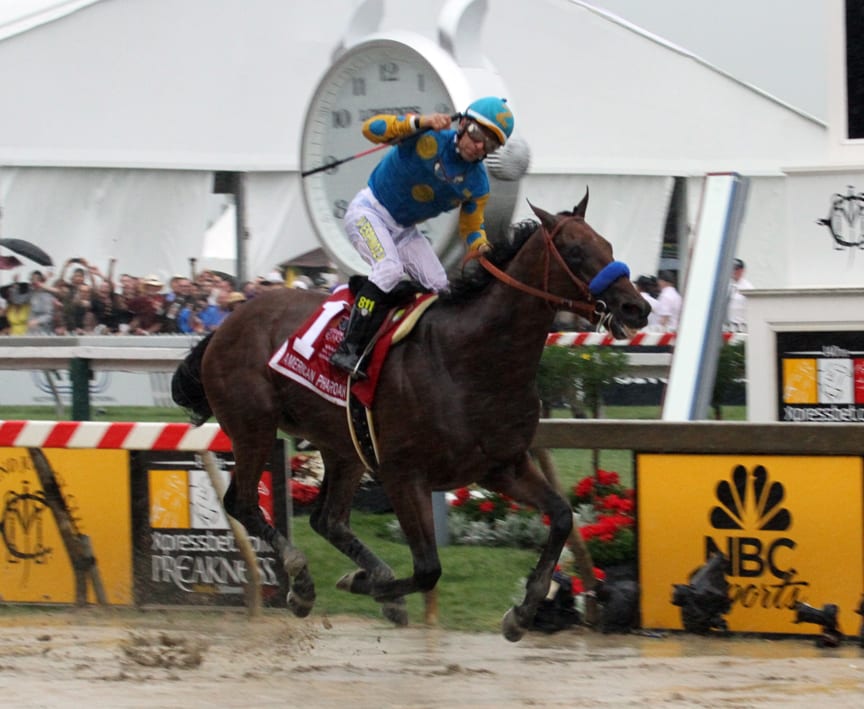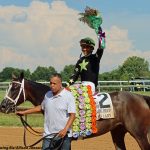THE WEEK IN SOCIAL MEDIA: FEB. 26

A Maryland-bred filly keeps her winning streak alive, Hall of Fame inductees were announced, and a lawsuit has been filed against the Jockey Club.
Here is the 411 on what racing fans in the Mid-Atlantic region have been talking about on social media over this past week:
Street Lute keeps it rolling
Maryland-bred filly Street Lute added yet another win to her collection over this past weekend, when she claimed the $100,000 Wide Country Stakes at Laurel Park, her fifth win in a row.
With Xavier Perez in the saddle, Street Lute made short work of her competition in the seven-furlong dash. After hustling briskly from the gate, the chestnut daughter of Street Magician rated close to the pace in third, while Little Huntress and Whiskey and Rye battled on the lead. The field bounded through early fractions of 22:62 for the opening quarter, and 44:91 for the half.
As the final bend loomed, Street Lute effortlessly rolled to the front and took command, facing little resistance from her foes. Fraudulent Charge hightailed it down the stretch with a late bid to try and catch the leader, but it was not enough to stop Street Lute’s reign. With a length advantage, Street Lute cruised over the wire in a final time of 1:23.59.
Bred by Dr. Thomas Bowman, Mrs. Bowman, and Dr. Brooke Bowman, Street Lute is owned by Lucky 7 Stables, and trained by John Robb. A current earner of $410,220, Street Lute was a $10,500 purchase in the 2019 Fasig-Tipton Midlantic Fall Yearling Sale. To date, the three-year-old filly, who was just recently honored as the Maryland-bred Champion Two-Year-Old Filly of 2020, has danced her way into the winner’s circle seven times from eight starts, capturing success in six black-type races along the way.
- Jorge Vargas notches 1,000th win
 Jockey Jorge Vargas, Jr. piloted Gran Yaco to a 13-1 upset in Monmouth’s Friday finale to earn the 1,000th win of his riding career.
Jockey Jorge Vargas, Jr. piloted Gran Yaco to a 13-1 upset in Monmouth’s Friday finale to earn the 1,000th win of his riding career.
Hall of Fame nominees announced
The National Museum of Racing and Hall of Fame has announced ten finalists to be inducted for 2021. Among those is none other than Triple Crown winner, American Pharoah.
Hall of Fame voters are granted permission to vote for as many or as few nominees as they see fit. All of the candidates that receive 50 percent or greater from the voters will be officially placed in the Hall of Fame this year. There are a total of 15 members on the voting committee, who will mail their ballots in by the first week of March. The results of their voting will be announced by May 5.
The ceremony for the Hall of Fame induction is slated to take place on August 6, at the Fasig-Tipton Sales Pavilion at Saratoga Springs, NY. Further details surrounding the ceremony are yet to be determined.
This marks the first year that American Pharoah was eligible to be selected for a spot in the Hall of Fame, as he has now been retired from racing for his fifth calendar year.
Bred and campaigned by Zayat Stables, American Pharoah captured the hearts of millions when he ended a 37-year drought that plagued the Triple Crown series. Trained by Hall of Famer Bob Baffert, and regularly piloted by Hall of Fame jockey Victor Espinoza, American Pharoah won nine of his eleven races on the track, including the Kentucky Derby, Preakness Stakes, and Belmont Stakes, as well as the Breeders’ Cup Classic (G1).
With nine graded stakes victories under his belt, two Eclipse Awards (Horse of the Year and Champion 3-Year-Old Male), and earnings of $8,650,300 in the bank, American Pharoah walked away from the racetrack as a living legend. He now stands at stud at Coolmore Stud.
Other finalists for Hall of Famer induction include fellow thoroughbreds Blind Luck, Game On Dude, Havre de Grace, Kona Gold, and Rags to Riches. Trainers Christophe Clement, Doug O’Neill, and Todd Pletcher are also among the finalists, along with jockey Corey Nakatani.
- Edy’s Flame heats up in first CT 2yo race
 Edy’s Flame dominated Charles Town’s first 2yo race of the year, a somewhat surprising result even if bettors focused on the right connections.
Edy’s Flame dominated Charles Town’s first 2yo race of the year, a somewhat surprising result even if bettors focused on the right connections.
Take this cap and…
A lawsuit was filed against the Jockey Club on Tuesday by Spendthirft Farm, Ashford Stud, and Three Chimneys. The lawsuit seeks to stop the stallion cap issued by the Jockey Club, which prevents stallions from breeding over 140 mares per breeding season. According to the three major farms involved in the lawsuit, the breeding cap serves “no purpose” and cannot be supported by science.
According to the lawsuit, “Rather than facilitating the soundness of the Thoroughbred breed, the Stallion Cap was instead adopted to serve the economic interests of a discrete group of participants in the Thoroughbred industry to the detriment of the more competitive participants. By artificially diverting breeding away from more popular to less popular stallions and by artificially capping the bidding price at which top stallion prospects can be purchased.”
According to the Jockey Club’s rule, “The total number of broodmares bred per individual stallion whose year of birth is 2020 or thereafter shall not exceed 140 per calendar year in the United States, Canada, and Puerto Rico. The Jockey Club shall limit the number of Stallion Service Certificates for such stallions to a maximum of 140 per calendar year.”
Plaintiffs in this case also claim that the stallion cap will potentially costs them hundreds of millions of dollars by placing such a limit on their top stallions. They fear that the limit may be further decreased in the future. In 2020, 42 stallions exceeded the 140 threshold.
The Jockey Club has not yet made a comment on this case. It has 21 days from the time they lawsuit was filed to respond to this case.
LATEST NEWS















